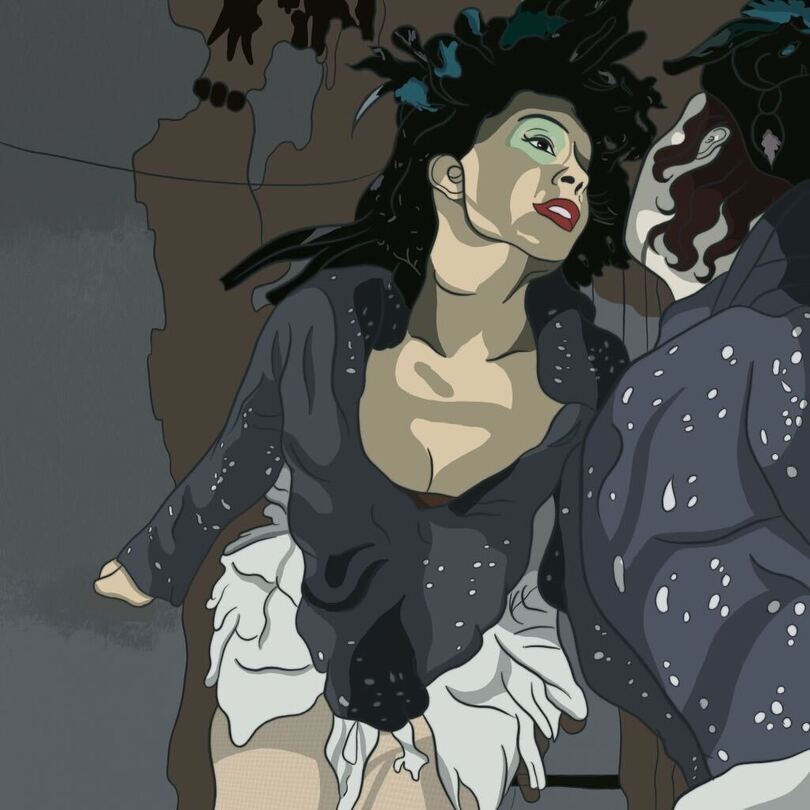Celeste stages musical comeback, outpours withheld rage on ‘Woman Of Faces’

"Woman Of Faces," released Friday, recounts the heartbreak that caused her career to be put on hold. It is Celeste's first album since 2021. Maria Masek | Contributing Illustrator
Get the latest Syracuse news delivered right to your inbox.
Subscribe to our newsletter here.
When British soul and jazz singer Celeste released her debut album in 2021, it topped the Official Albums Chart in the UK. When she earned an Oscar nomination for “Hear My Voice” in “The Trial of the Chicago 7,” the singer seemed poised for superstardom. But the COVID-19 pandemic, followed by a tumultuous end of a relationship, saw Celeste’s hot streak subside.
Celeste’s stalled career seems to be making a return with her sophomore album “Woman Of Faces,” released on Friday. In the 33-minute runtime, the album sees Celeste in distress, unleashing a completely different style of the musician.
Celeste’s debut album was her soft introduction to the world; she showcased her pure, liquid gold vocals and her ability to turn simple lyrics into gut-wrenching storytelling. But “Woman Of Faces” reignites that success in a bigger and bolder recount of the heartbreak that paused her career.
The first song on the album, “On With The Show,” starts with a solemn piano arrangement. Slow and dreary, Celeste opens with a broken heart, detailing the aftermath of a breakup.
“And it’s a little bit absurd my world spins on / Like a theatre of the day by day, there’s so much wrong / Yes, I know out there is our abyss / But I must dress up and move like this / On with the show.”
A string arrangement comes in, heightening this tension in the chorus. The strings quicken before reaching a crescendo as Celeste becomes enraged at the circumstances she’s forced into as the song ends abruptly.
Fueled by solemnity and anger, “On With The Show” critiques the idea of being a showwoman forced to perform while her life is in ruin. It’s clear that Celeste has been withholding these emotions for a while, pivoting away from her debut album’s more R&B, soul rhythm.
The classical theme picks back up with the second track, “Keep Smiling.” The song provides more context to Celeste’s profound feelings with the breakup: she hasn’t moved on.
“It’s not the words that I can’t say / It’s just the shame that I can’t make.”
Celeste’s inability to move on puts the singer in a daze; she doesn’t know how to handle her feelings, so she insists on “keep smiling” instead. The hypnotic chorus repeats this verse four times, tricking herself into thinking that if she ignores her feelings, everything will be better.
To put it simply, “Keep Smiling” is depressing. As the track fades out, the verse “Look away” repeats before concluding with “Look what you made,” referring to the emotional mess in Celeste’s life.
The third track, “Woman Of Faces,” encompasses the album’s central theme of Celeste’s constant need to put up a front against the world, losing and detaching herself from reality as she becomes the woman of faces.
“To be a woman, she must face it / Pick a style in style and display it / Who really knows the woman of faces? / Not you, not you, not me.”
As the song approaches its climax, the strings quicken as Celeste comes face-to-face with her true self. She faces a mental battle between her two sides before leaving listeners on a cliffhanger: Is Celeste able to break free from the woman of faces? Or does the woman of faces endure? The track’s orchestral sound mimics a dramatic film soundtrack; it’s emotional, personal and leaves you wanting more.
“Time Will Tell” and “People Always Change” revert back to Celeste’s familiar roots. Shifting away from the bolder orchestral sound and into acoustics, the tracks’ lyrics focus on simplicity as Celeste focuses on the aftermath of her breakup. After a cinematic first half, the two songs revert back to Celeste’s R&B origins in “Not Your Muse (Deluxe),” disrupting the overall flow of the album.
The album’s penultimate track, “Could Be Machine,” flips the album on its head. The song suddenly takes on a rock instead of an orchestral arrangement. Starting with a piano and a cello-like sound layered, Celeste’s cadence is faster than previous tracks before the pre-chorus drops into a rock ballad.
“Could Be Machine” fleshes out Celeste’s anger she’d been harboring post-breakup. She’s letting out her feelings through a high-energy, piercing track. While I appreciate the experimental approach, it ultimately sticks out like a sore thumb in a sophisticated album. Though it makes sense that her rage is translated into a thumping rock genre, it doesn’t flow as well compared to the rest of the album.
In an epic conclusion, “This Is Who I Am” is the boldest song on the entire album. Starting with an ominous piano score, its darker nature signals a shift in Celeste’s character.
In the album’s central theme, Celeste discusses her inability to move on, becoming emotionally attached to her ex and losing herself in the process — only her ex knows who the real Celeste is.
“For only you may ever see me true / So only you can tell them this is who I am / This is who I am.”
Celeste’s emotional state post-breakup is devastating, but in that devastation is her most powerful song on the album. Celeste’s vocals shine the most in “This Is Who I Am.” Her singing is clear, crisp and enduring, delivering a sucker punch to the stomach.
“Woman Of Faces” transforms Celeste as an artist. Pivoting away from her melancholic origins and into a bolder, yet vulnerable new look, “Woman Of Faces” is an impressive change in Celeste’s discography, showcasing her ability to adapt to an intimidating classical approach — an approach many artists today don’t even attempt.





